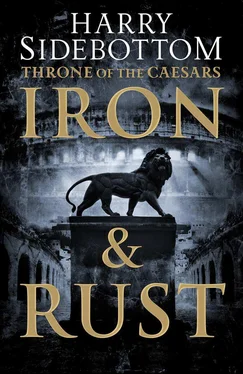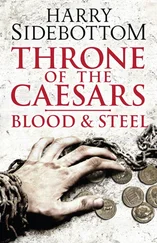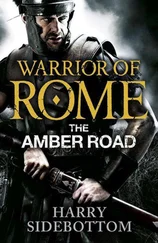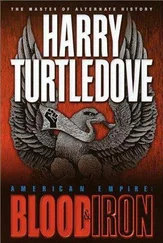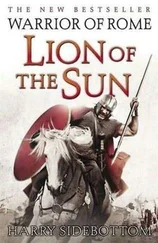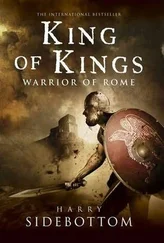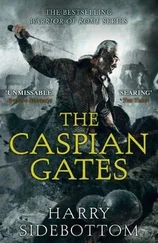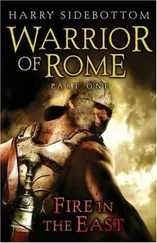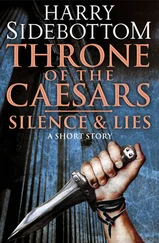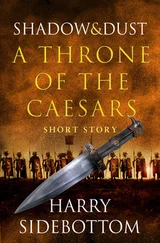Harry Sidebottom - Iron and Rust
Здесь есть возможность читать онлайн «Harry Sidebottom - Iron and Rust» — ознакомительный отрывок электронной книги совершенно бесплатно, а после прочтения отрывка купить полную версию. В некоторых случаях можно слушать аудио, скачать через торрент в формате fb2 и присутствует краткое содержание. Год выпуска: 2014, Издательство: HarperCollins Publishers, Жанр: Исторические приключения, на английском языке. Описание произведения, (предисловие) а так же отзывы посетителей доступны на портале библиотеки ЛибКат.
- Название:Iron and Rust
- Автор:
- Издательство:HarperCollins Publishers
- Жанр:
- Год:2014
- ISBN:нет данных
- Рейтинг книги:4 / 5. Голосов: 1
-
Избранное:Добавить в избранное
- Отзывы:
-
Ваша оценка:
- 80
- 1
- 2
- 3
- 4
- 5
Iron and Rust: краткое содержание, описание и аннотация
Предлагаем к чтению аннотацию, описание, краткое содержание или предисловие (зависит от того, что написал сам автор книги «Iron and Rust»). Если вы не нашли необходимую информацию о книге — напишите в комментариях, мы постараемся отыскать её.
Iron and Rust — читать онлайн ознакомительный отрывок
Ниже представлен текст книги, разбитый по страницам. Система сохранения места последней прочитанной страницы, позволяет с удобством читать онлайн бесплатно книгу «Iron and Rust», без необходимости каждый раз заново искать на чём Вы остановились. Поставьте закладку, и сможете в любой момент перейти на страницу, на которой закончили чтение.
Интервал:
Закладка:
The Eclogues and Georgics of Virgil showed a world of innocence and honesty, the Procurator said. Old men of antique virtue were bent and gnarled by their life-long labours. Young shepherds played the pipes as they chastely wooed virginal shepherdesses. The visitor found homespun hospitality and wisdom on offer at every humble hearth.
So far, so good — the Procurator appeared to be enjoying his own performance — but men who combined an active life with that of culture, men who accepted their duties towards their estates and towards the Res Publica , men who actually ventured into the countryside, knew different. There they found rough, uncouth accents and manners. Worse, they found squalid indolence and base superstition. Unguided by philosophy or any higher culture, the hairy locals learnt to lie as they took their mother’s milk. Untrammelled by compassion, they regarded violence and force as the ultimate argument. Who had not heard the saying Make your will before you venture down a country lane ?
After the Procurator’s litany of rustic iniquity ended, three witnesses swore to his innocence. Finally, the elder Gordian ordered the principals to withdraw and asked the advice of his assessors.
Mauricius launched into an extempore oration of his own. His family was as old as any in Africa, descended both from local landowners and Roman colonists. For generations they had bred too many children. Equal inheritance had reduced them to poverty. He himself had been left just one small field by his father. At first he had worked it with his own hands. He had rented other fields, hired men. Gradually, by backbreaking labour, and the favour of the gods, he had rebuilt his family fortunes. Now he owned wide estates and sat on the city councils at Thysdrus and here at Hadrumetum. He offered his own life as evidence that poverty did not have to drive out honesty and virtue.
More relevant to the case in hand, Menophilus pointed out that the tenants had much to lose by bringing the case. If they lost, they had laid themselves open to the reprisals of the Procurator and his friends. All they were asking for was what the law should already give them.
One by one, Gordian included, the assessors agreed this was true.
Those involved were brought back into the court.
‘In the name of our sacred Emperor Gaius Iulius Verus Maximinus, and by the powers vested in me as Proconsul of Africa, I find the complaint upheld. Let the plaintiffs erect an inscription on stone setting out this judgement and the laws of the divine Hadrian. Let no one in future demand more of them than the laws allow, and let no one offer them violence or oppression.’
The Procurator bridled. ‘These rustics are liars. Avoiding the duties they owe to the Emperor is tantamount to treason. Supporting them runs the risk of the same charge. As part of my duties, I am in regular correspondence with the sacred court.’
There was a silence in the courtroom.
‘You think the Emperor would value your word above mine?’ There was no tremor in the elder Gordian’s voice.
On an instant, the Procurator capitulated. No, no, nothing of the sort. Indeed he was sure the noble Proconsul was right. Some of his own agents may have been over-zealous in the interests of the sacred Maximinus. He would see it never happened again.
In the interests of the sacred Maximinus. The irony of the phrase struck Gordian. They had fought the battle of Ad Palmam in the name of Alexander, not knowing that the Emperor was already dead and mutilated. One Emperor died; another took the throne. The governance of the empire continued. It was unlikely this Maximinus would affect them much out here in Africa.
CHAPTER 9
The Northern Frontier
A Camp outside Mogontiacum,
Eleven Days before the Kalends of May, AD235
When they had spread the food and blankets, Timesitheus sent the servants away. No one’s loyalty was infinite.
They reclined in the shade of an apple tree: Timesitheus, his wife, Tranquillina, and the two disaffected Senators. Eleven days before the kalends of May, and even here, at long last, spring had arrived. The sun shone, and the first blossom was on the boughs above their heads. They ate and talked, ostensibly at their ease. Of course, there was no ignoring the activity down at the river. And, Timesitheus thought, the Senators must have been wondering why they had been invited to this outdoor midday meal. His own wheel was very much in the ascendant; theirs on a downward turn.
The noise rolled up the slope: shouts of encouragement, jeers and catcalls, the squeal of wood on wood, the rhythmic ring of hammer on anvil, the deeper thump of a pile-driver and, intermittently over it all, stentorian voices of authority. Down there, all was movement and bustle. Teams of horses dragged big baulks of timber down to the riverbank. Mobile sawmills cut and trimmed them. Gangs of men unloaded huge cables from wagons. Smoke curled up from the forges. Out on the water, the sixth boat was being manoeuvred towards the pontoon bridge. It was guided from a rowing skiff upstream; the men let it drift down. When it reached the right place, a big pyramid-shaped bag of stones was heaved over its prow to act as an anchor. At the same instant ropes snaked out, and in moments the new addition was lashed in place at just the correct interval. Timbers already connected the next one into the rest of the bridge. On those closer to the land, these beams had been decked over, and screens erected on either side.
About twenty yards upstream from the bridge the first breakwater showed above the surface. It consisted of three stout stakes. Iron clamps held it together, making an arrowhead facing into the flow of the water. The raft bearing the pile-driver was moored where the second breakwater would stand. Timesitheus let his gaze linger on the men working the pulleys. Inch by inch, the massive plug of iron was pulled up its curved wooden runner. The order to halt carried clearly to his ears. Another command, a lever thrown, and — oddly noiseless at that distance — the weight fell. The sound of the impact lagged behind its viewing. As the men bent to their task and the lump of shaped metal began another ascent, the great stake it had hit could be seen to have been driven at least three feet further down into the muddy bed of the Rhine.
‘Your bridge is most impressive.’ Marcus Claudius Venacus was of middle height, corpulent. If he was intelligent, his face did him a disservice. However, Maximinus’ abolition of the standing committee, among whose sixteen Senators Venacus had served, appeared to have done nothing to diminish his self-regard.
‘Your energy puts all of us to shame.’ Although somewhat protruding, Caius Petronius Magnus’ eyes promised rather more intelligence than those of Venacus. Yet that did not pledge much, and Magnus had been unable to conceal how badly he had taken the end of their official position. ‘I do not know how you have found time to add the many duties of Prefect of Works to those involved in collecting all the supplies for the expedition. You seem overburdened, while others remain in enforced inactivity.’
Timesitheus smiled. ‘The labour is long and hard, but that makes intervals of leisure like this, snatched moments with such pleasant company, all the more enjoyable.’
Both Senators murmured politely.
Timesitheus gave Venacus his most winning smile. ‘But you are over-appreciative of my efforts.’ Timesitheus pointed off upriver, where a line of unconnected piles of masonry crossed the stream. ‘If we had been making something to last, something worthy of Rome, we should have rebuilt the superstructure of the old bridge of Trajan. Or, at least, we could have copied Julius Caesar and made a proper, well-fixed wooden bridge. But Maximinus Augustus said time and money were against such plans. My bridge is not built to last.’
Читать дальшеИнтервал:
Закладка:
Похожие книги на «Iron and Rust»
Представляем Вашему вниманию похожие книги на «Iron and Rust» списком для выбора. Мы отобрали схожую по названию и смыслу литературу в надежде предоставить читателям больше вариантов отыскать новые, интересные, ещё непрочитанные произведения.
Обсуждение, отзывы о книге «Iron and Rust» и просто собственные мнения читателей. Оставьте ваши комментарии, напишите, что Вы думаете о произведении, его смысле или главных героях. Укажите что конкретно понравилось, а что нет, и почему Вы так считаете.
